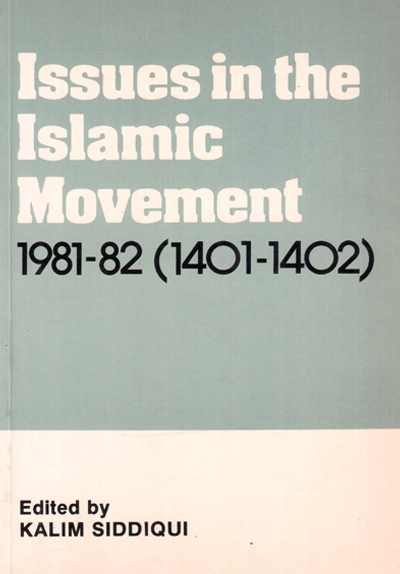Issues in the Islamic Movement 1981-82 (1401-1402)

Author(s): Kalim Siddiqui
Publisher: The Open Press
Published on: Jumada' al-Ula', 1403 1983-03
ISBN: 0-905081-13-7 (hbk.), 0-905081-14-5
No. of Pages: 393
Foreword
by Kalim Siddiqui
History does not move in leaps and bounds. Turning points and watersheds usually exist only in the imagination of the historians. Text-books need 'landmarks' to provide students with learning aids, and authors need them for dividing their works into neat self-contained chapters. Journalists, on the other hand, are neither historians nor authors. It can be argued, of course, that journalists are historians in a hurry or that they provide a running commentary as history takes shape from day to day.
Perhaps on another occasion we will have to examine the definitive role of journalism and journalists in the Islamic movement. At present we need only note the general fact that, like the Islamic movement itself, Islamic journalism has been largely stagnant. Such journalism as has been undertaken in the name of Islam has merely reflected the confused state of the 'Islamic parties' and their ambivalent attitudes on such issues as democracy, capitalism, nationalism and the post-colonial order of the nation-States. This cloud is now beginning to lift under the powerful influence of the Islamic Revolution in Iran. It is now possible to so the issues in the Islamic movement more clearly than at any time during or since the colonial period. For the second year the Crescent International has tried to capture the passing scene of world events bravely and impartially. All objectivity, however, is in the end subjective. The duty of the journalist in the Islamic movement is to make his powers of observation, faculties of selection of facts, and skills of expression subject to the service of Allah, His Prophet, upon whom be peace, the Islamic State and the Ummah.
These are very high standards and will be reached only slowly over a period of time. The Muslim journalist setting out on this course has few guidelines. Most of the established 'Islamic' journals have, for the moment, chosen to become tools of reaction serving their masters in the 'Islamic parties' and their patrons in the corrupt regimes of Saudi Arabia, Pakistan, and other nation-states. The time to expose the duplicity of these journals, their editors and managers is not yet. For the moment it is sufficient that Zafar Bangash and his team have set high standards of integrity in the journalism of the Islamic movement.
During the year a new and equally promising development has been the introduction of Muslimedia, a 'news and feature service of the Islamic movement', from London. It is edited by Zafarul Islam Khan and, in a short time, has secured the services of writers and reporters from many parts of the world. A number of Muslimedia articles have been included in this volume.
The 1980-81 edition of this book was an instant success. Within six months it went into second print. It is now widely used by academics, students and journalists for easy reference. The informal chronological method of arrangement has been retained. The list of contents at the beginning and an extensive index at the end are retained as sufficient guides to subjects scattered throughout the volume. My daughter Shama has once again read through the typescript. The errors that remain are all mine.
The last article in this anthology, 'Is politics relevant?', was first published in 1973. I have included it here to remind my recent critics of the direction in which my thoughts had moved a long time before the Islamic Revolution in Iran.
Kalim Siddiqui
The Muslim Institute
6 Endsleigh Street
London WCIH ODS
September 14, 1982
Dhu al-Qa'adah 24, 1402
